How we communicate matters. The first step to creating more inclusive spaces is using language that makes all parties involved feel comfortable and supported. In the spirit of validating others by using inclusive and identity-affirming language, we produced a glossary of LGBTQ+ terms.
Disclaimer: By no means is this meant to be a comprehensive list. LGBTQ+ terminology is constantly evolving and growing.
Agender
A person who does not identify with any gender, or intentionally doesn’t follow expectations of gender.
Ally
A straight and/or cisgender person who supports and advocates for LGBTQ+ people.
Androgyne
A gender identity in which a person feels their gender is between ‘male’ and ‘female’ and feels both masculine and feminine simultaneously. An androgyne person may feel more masculine than feminine, more feminine than masculine, or an equal amount of both at any given time.
Androgynous
A person with both masculine and feminine qualities.
Androsexual/Androphilic
Being primarily sexually, aesthetically, and/or romantically attracted to masculinity.
Aromantic
An adjective used to describe people who do not experience romantic attraction.
Asexual
An adjective used to describe people who do not experience sexual attraction.
Bear
A gay or bisexual man who has facial/body hair and a supple body.
Bi-curious
Bicurious people are exploring whether or not they’re attracted to people of the same gender and people of different genders, too.
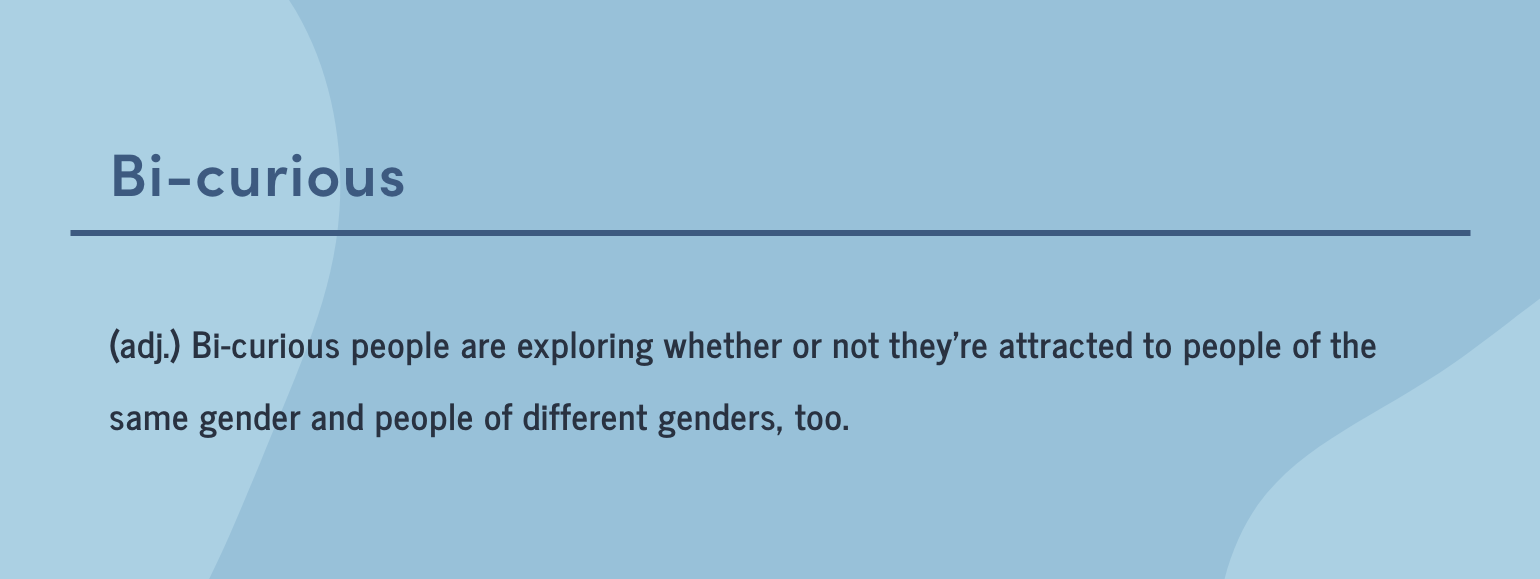
Bigender
Someone who identifies with two distinct genders. Bigender people don’t necessarily identify with each gender 50% of the time, and unlike gender fluid people, they don’t exist on a spectrum either.
Binding
The process of flattening one’s breasts to have a more masculine or flat appearing chest.
Bisexual or Bi
This describes a person who has the capacity to form enduring physical, romantic, and/ or emotional attractions to those of the same gender and to those of another gender. Bisexual people are not required to have had specific sexual experiences to consider themselves bisexual.
Butch
Someone who identifies and presents as masculine. This term is not restricted to specific genders.
Cisgender
Describes a person whose gender identity is the same as their sex assigned at birth. “Cis-” is a Latin prefix meaning “on the same side as,” and is, therefore, an antonym of “trans-.”
Closeted
Describes a person who is not open about their sexual orientation. It’s preferred to refer to someone as “not out” about being LGBTQ+.
Cross-dresser
While anyone may wear clothes associated with a different sex, the term cross-dresser is typically used to refer to men who occasionally wear clothes, makeup, and accessories culturally associated with women. These men typically identify as heterosexual. This activity is a form of gender expression and is not done for entertainment purposes. Cross-dressers do not wish to permanently change their sex or live full-time as women. This replaces the term “transvestite.”
Demiboy
Similar to bigender, someone who identifies as a demiboy experiences their gender as partly boy and partly another gender.
Demigirl
Similar to bigender, someone who identifies as a demigirl experiences their gender as partly a girl and partly another gender.
Demiromantic
People who do not experience romantic attraction until a strong emotional or sexual connection is formed with a partner.
Demisexual
People on the asexual spectrum who do experience some sexual attraction, but only in certain situations, like after they’ve formed a strong emotional or romantic connection with a partner.
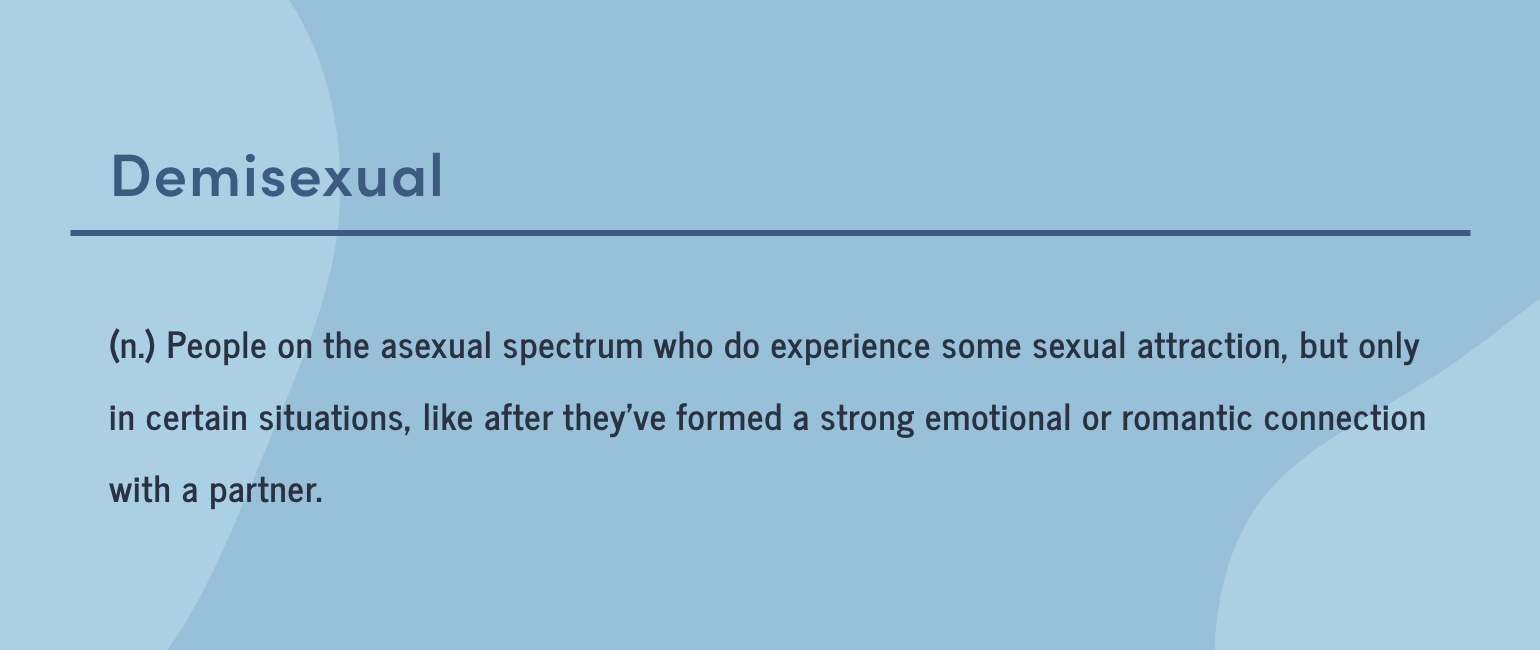
Drag king
A (usually cisgender) woman who performs as a man for an audience.
Drag queen
A (usually cisgender) man who performs as a woman for an audience.
Female to Male or FTM
A term used to talk about transgender men, who were assigned female at birth and have since transitioned to male.
Gay
The adjective used to describe people whose enduring physical, romantic, and/ or emotional attractions are to people of the same gender (e.g., gay man). Sometimes lesbian is the preferred term for women.
Gender creative
People, usually children, who don’t conform to gender stereotypes, but also don’t necessarily identify as transgender. They are sometimes also called gender non-conforming.
Gender dysphoria
Discomfort or distress caused by one’s assigned sex and the desire to change the characteristics that are the source.
Gender expression
External manifestations of gender, expressed through a person’s name, pronouns, clothing, behavior, etc.
Gender identity
A person’s internal sense of their gender, regardless of their genitalia.
Gender non-conforming
A term used to describe some people whose gender expression is different from conventional expectations of masculinity and femininity.
Gender normative/gender straight
A synonym for cisgender, gender straight people are those whose gender identity matches up with expectations of their sex assigned at birth.
Gender questioning
A person who is questioning their current gender identity and/or exploring other identities and presentations.
Gender variant
Like gender nonconforming, gender variant is an umbrella term used for anyone who is not cisgender.
Gender-fluid
Someone for whom gender identity and presentation is a spectrum. A gender-fluid person doesn’t confine themself to one gender, or even a few. Instead, they may fluctuate between presenting as feminine, masculine, neither, or both.
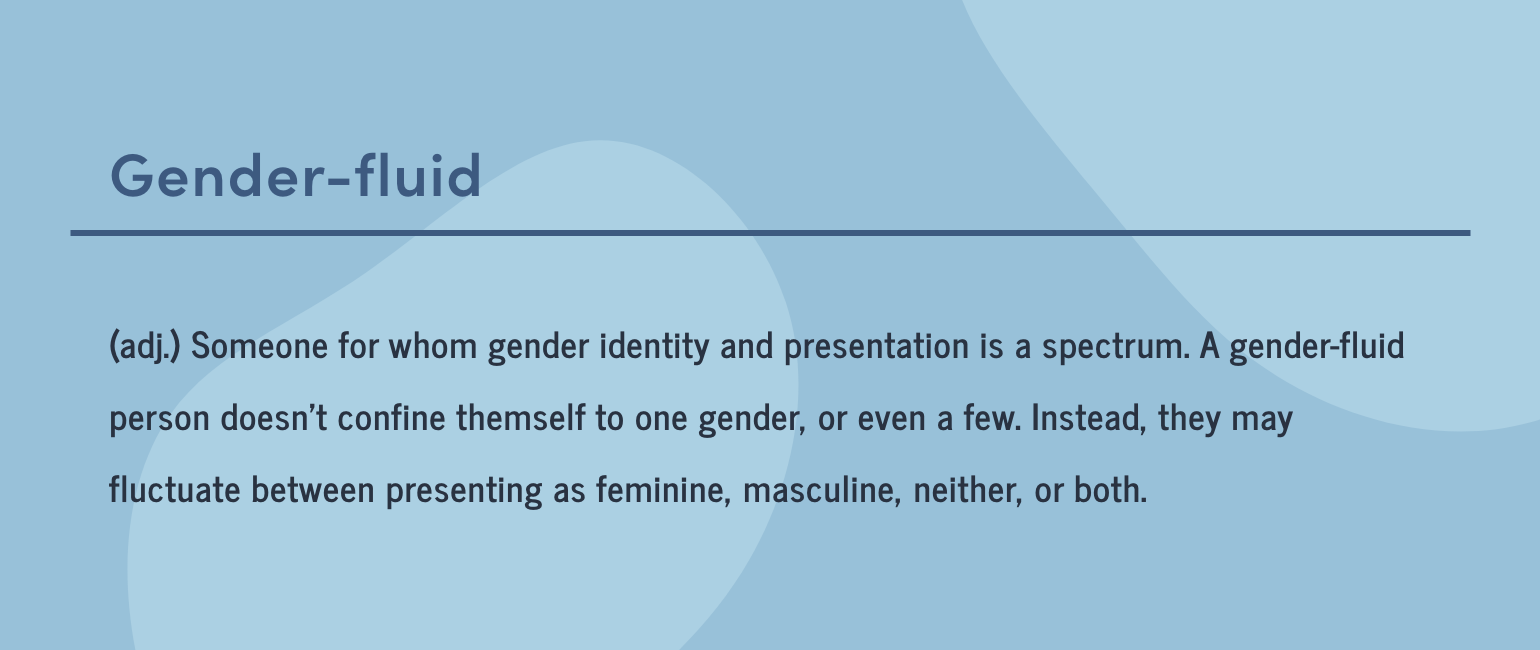
Gynesexual/gynephilic
Being primarily sexually, aesthetically, and/or romantically attracted to femininity.
Heteronormativity
The assumption that heterosexuality is the standard for defining normal sexual behavior and that male-female differences and gender roles are the natural and immutable essentials in normal human relations.
Heterosexual
An adjective used to describe people whose enduring physical, romantic, and/ or emotional attraction is to people of the opposite sex. Also known as straight.
High femme
Often used to describe a lesbian, bisexual, or queer woman who presents and identifies firmly as feminine.
Homosexual
An outdated clinical term referring to queer people that is considered derogatory and offensive.
Intergender
Someone who experiences their gender as in between other genders, such as someone whose gender falls somewhere between being a man or a woman.
Intersex
An umbrella term describing people born with reproductive or sexual anatomy and/or a chromosome pattern that can’t be classified as typically male or female. Those variations are also sometimes referred to as Differences of Sex Development (DSD.) Avoid the outdated and derogatory term “hermaphrodite.” While some people can have an intersex condition and also identify as transgender, the two are separate and should not be conflated.
Lesbian
A woman whose enduring physical, romantic, and/or emotional attraction is to other women. Some lesbians may prefer to identify as gay.
Lipstick lesbian
Similar to femme, lipstick lesbian is used to describe a lesbian who presents their gender in a feminine way. It is sometimes considered a derogatory term.
Male to Female or MTF
A term used to talk about transgender women, who were assigned male at birth and have since transitioned to female.
Masculine-of-center
Used to describe people who feel, and often present, as masculine but may not identify as a man. Masculine-of-center people may also identify as butch, stud, aggressive, boi, transmasculine, etc.
Masculine-presenting
Describes someone who expresses gender in a masculine way. Someone who is masculine-presenting might or might not also be masculine-of-center and vice versa.
Metrosexual
Usually used to describe a straight man, although some queer men may also use the term to describe a man who spends more time on his appearance than is considered normal for men.
Misgender
When someone uses the wrong pronoun or term to refer to a person, such as calling a transgender boy ‘her’ or a transgender girl ‘him’.
Mx.
Used instead of Mr., Mrs., or Ms. for someone who does not identify as either a man or a woman. Example: Mx. Smith.
Neutrois
An umbrella term used for people who do not identify as either a man or a woman. Agender, gender-fluid, non-binary, and genderless people may all also identify as neutrois.
Non-binary and/or Genderqueer
Terms used by some people who experience their gender identity and/or gender expression as falling outside the categories of man and woman. They may define their gender as falling somewhere in between man and woman, or they may define it as wholly different from these terms. Non-binary is sometimes shortened to enby or NB.
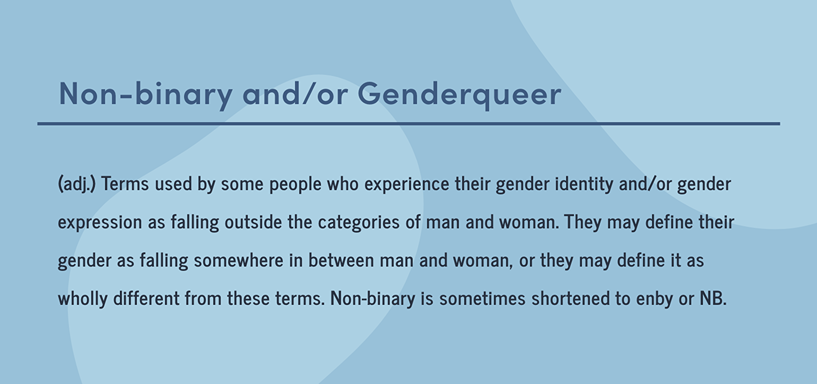
Out
Refers to a person who self-identifies as LGBTQ in their personal, public, and/or professional lives. Preferred to the term “openly gay”.
Packing
Wearing a phallic device on the groin and under clothing for any purposes including (for someone without a biological penis) the validation or confirmation of one’s masculine gender identity, seduction, and/or sexual readiness (for one who likes to penetrate another during sexual intercourse).
Pangender
A Non-binary gender identity, referring to people who experience all gender identities either simultaneously or over time.
Panromantic
Someone who has romantic feelings for a person regardless of their sex or gender.
Pansexual
A person who has the capacity to form enduring physical, romantic, and/ or emotional attractions to any person, regardless of gender identity.
Pass/Passing
This refers to the ability of an LGBTQ person to go out into society and be assumed to be either straight or cisgender.
Polyamorous
Describes people who have consensual relationships that involve multiple partners.
Polygender
Someone who has more than one gender and either experiences all of their genders at once or is moving between genders at any given time.
Queer
An adjective used by some people, particularly younger people, whose sexual orientation is not exclusively heterosexual (e.g. queer person, queer woman). Typically, for those who only identify as queer, the terms lesbian, gay, and bisexual are perceived to be too limiting and/or fraught with cultural connotations they feel don’t apply to them. But many people identify as both queer and another sexual orientation (e.g. queer and a lesbian). Once considered a pejorative term, queer has been reclaimed by some LGBT people to describe themselves; however, it is not a universally accepted term, even within the LGBT community.
Queerplatonic
Refers to a relationship that has the sort of intensity, closeness, and emotional connection expected of a romantic relationship, but is not romantic. People who are uncomfortable using the term “queer” use quasiplatonic instead to refer to the same type of relationship.
Sex
The classification of a person as male or female. At birth, infants are assigned a sex, usually based on the appearance of their external anatomy. This is what is written on the birth certificate. A person’s sex, however, is actually a combination of bodily characteristics including chromosomes, hormones, internal and external reproductive organs, and secondary sex characteristics.
Sex assigned at birth or SAAB
Refers to the sex (usually male or female, but sometimes intersex) a doctor designated a person as after examining their genitals.
Sex reassignment surgery or Gender confirmation surgery
Refers to doctor-supervised surgical interventions, and is only one small part of transition. Avoid the phrase “sex change operation.” Do not refer to someone as being “pre-op” or “post-op.” Not all transgender people choose to or can afford to, undergo medical surgeries.
Sexual orientation/Sexuality
Describes a person’s enduring physical, romantic, and/or emotional attraction to another person. Gender identity and sexual orientation are not the same. Transgender people may be straight, lesbian, gay, bisexual, or queer. For example, a person who transitions from male to female and is attracted solely to men would typically identify as a straight woman.
Skoliosexual
Being primarily sexually, romantically, and/or aesthetically attracted to genderqueer, transgender, and/or non-binary people.
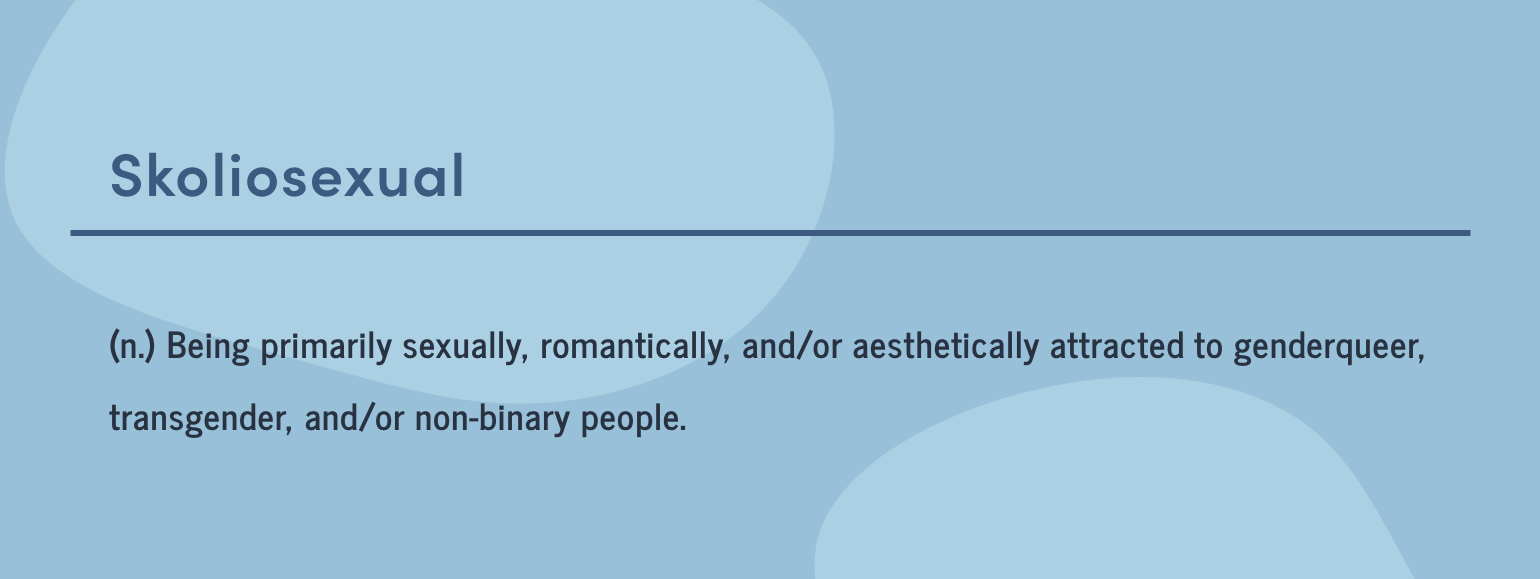
Soft butch
Used to describe a queer woman who presents masculine, but also slightly feminine. A soft butch may dress in men’s clothing, but have long hair or wear makeup.
Stone butch
Often used to describe a lesbian who presents and identifies firmly as masculine. Stone butch people might also identify as transgender or non-binary but don’t always.
They/their
The singular they can be used to describe someone who identifies as neither male nor female. It is increasingly common for people who have a non-binary gender identity to use they/them as their pronoun.
Third gender
A term used in some cultures to describe someone who doesn’t identify as a man or a woman. Third sex is sometimes also used to talk about intersex people. Third gender can also mean many different things to people who use the term as a way to break the gender binary.
Top surgery
A gender-affirming surgery for transgender people, often to either remove breasts (for transgender men) or add breast implants (for transgender women).
Trans
Used as shorthand to mean transgender or transsexual, or sometimes to be inclusive of a wide variety of identities under the transgender umbrella.
Transfeminine
Someone who was assigned male at birth, but identifies and presents as feminine. This person may or may not identify totally as a woman or a transgender woman.
Transgender
An umbrella term for people whose gender identity and/or gender expression differs from what is typically associated with the sex they were assigned at birth. People under the transgender umbrella may describe themselves using one or more of a wide variety of terms, including transgender. Many transgender people are prescribed hormones by their doctors to bring their bodies into alignment with their gender identity. Some undergo surgery as well. But not all transgender people can or will take those steps, and a transgender identity is not dependent upon physical appearance or medical procedures.
Transition
Altering one’s birth sex is not a one-step procedure; it is a complex process that occurs over a long period of time. Transition can include some or all of the following personal, medical, and legal steps: telling one’s family, friends, and co-workers; using a different name and new pronouns; dressing differently; changing one’s name and/or sex on legal documents; hormone therapy; and possibly (though not always) one or more types of surgery. The exact steps involved in transition vary from person to person. Use this instead of the phrase “sex change.”
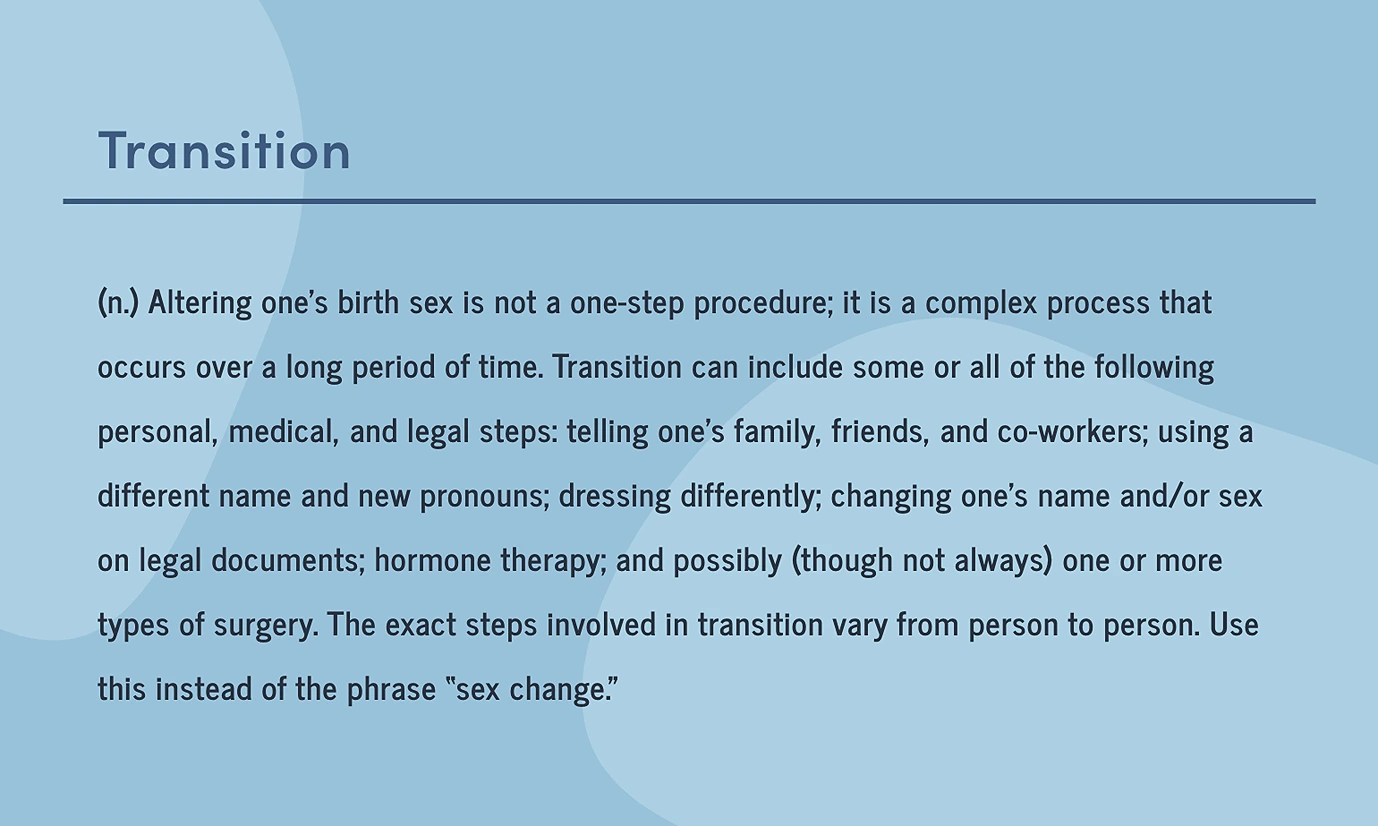
Transmasculine
Someone who was assigned female at birth, but identifies and presents as masculine. This person may or may not identify totally as a man or a transgender man.
Transsexual
An older term that originated in the medical and psychological communities. Still preferred by some people who have permanently changed or seek to change their bodies through medical interventions, including but not limited to hormones and/or surgeries. Unlike transgender, transsexual is not an umbrella term. Many transgender people do not identify as transsexual and prefer the word transgender. It is best to ask which term a person uses.
Trigender
Someone who experiences three distinct genders, either all at once or is moving between them.
Ze/hir/hirs
Gender-inclusive pronouns that some transgender, gender fluid, and non-binary people choose to use instead of binary gendered pronouns, like she/her/hers and he/him/his.
Sources: Refinery29 and The Pride Center for Sexual Orientation and Gender Diversity.
About the Author

Consistent, proactive, and thoughtful healthcare is not only a priority, it is a demand by men who live well. Bespoke Surgical is built on this understanding. Today's modern, urban male has become adept at making the most of life, believing in living fully and completely in all aspects of work, fitness, relationships, and family. This makes excellent health more important than ever.
Join Our Newsletter
Subscribe to receive exclusive content, new product information, and the latest news.
Featured products
Read More
General
How Many Dating App Matches Does It Take To Find A Hookup?
When it comes to finding a hookup on dating apps, it’s truly a numbers game....
General
The Landscaping “Down There” Survey
What does the modern American’s hair removal routine really look like and what’s the motivation...
General
The Nudity Confidence Survey
The recent Vanderpump Rules drama has captivated audiences in the reality TV universe and shined...
